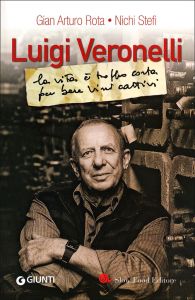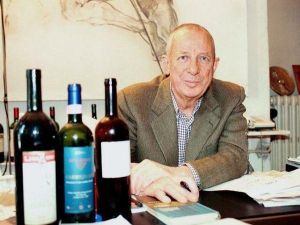On May 15th, 20 years after the death of the father of food and wine criticism, poet of wine and food, ambassador of Made in Italy, as well as master of journalism, “his” favorite place will be inaugurated.
Twenty years ago, on a cold day at the end of November, Luigi “Gino” Veronelli, poet of wine and food, the father of food and wine criticism, master of journalism for all of us lovers of good food, died in Bergamo. He was 78 years old. He tiptoed away well before the 100 years he had set himself as a goal. Son of a Milanese chemical industrialist, he was born in the Milanese district of Isola on 2 February 1926.
Ante litteram ambassador of Made in Italy (before, long before Slow Food, Gambero Rosso and Eataly), enlightened and revolutionary philosopher, courageous and irreverent anarchist, wine heretic as he himself liked to define himself (not oenologist, i.e. cellar technician, as some simplistically and erroneously defined it) has left indelible traces and a legacy on the philosophical-cultural level that the Luigi Veronelli Permanent Seminar is carrying forward with passion in the footsteps traced by the master.
He loved to repeat: “Life is too short to drink bad wines”
For those wishing to delve deeper into the figure of Veronelli, we recommend reading the beautiful volume “Life is too short to drink bad wines” (Giunti editore). It is not a biography, rather a fresco on the man Veronelli. A journalist? Yes, but that’s an understatement. A writer? Surely. A lover of good food who has dealt with wines and foods? Certainly. But above all a lover of “bien vivre” and an extraordinary singer of beauty, freedom, friendship, love, eros. A revolutionary? How can you deny it given that he changed the world of food and wine. A politician? No. He, an unrepentant anarchist, abhorred politicians. A philosopher? Yes, but not pedantic, nor academic.
The meeting at the Savoy Hotel in London with Carnacina and the two buttered eggs
 a life spent defending the demands of rural Italy and the peasant universe. Among the anecdotes we remember his first contact with wine, offered to him by his father on the day of his First Communion with the recommendation to “drink it with care because inside the glass there is the effort of those who cultivate the vineyard” and the meeting with the famous Maître Luigi Carnacina. Trained at the Liceo Classico Parini, he particularly distinguished himself in the humanities and in this regard it is said that he took the final exam speaking exclusively in ancient Greek.
a life spent defending the demands of rural Italy and the peasant universe. Among the anecdotes we remember his first contact with wine, offered to him by his father on the day of his First Communion with the recommendation to “drink it with care because inside the glass there is the effort of those who cultivate the vineyard” and the meeting with the famous Maître Luigi Carnacina. Trained at the Liceo Classico Parini, he particularly distinguished himself in the humanities and in this regard it is said that he took the final exam speaking exclusively in ancient Greek.As a gift, his father gave him a stay at the Savoy Hotel in London and on the first evening – bold and boastful – he ordered the most expensive dish in the restaurant. There was a great surprise when, having opened the cloche, he was served two buttered eggs. Pissed, he asked the accountant for it maître: “Yes, buttered eggs are our most expensive dish – was the answer – because inside there are the wisdom, experience and search for perfection of chef Cesare Balestreri.”
A life lesson. That maître it was Luigi Carnacina, the very famous gastronome with whom Veronelli himself later collaborated to write one of the most famous cooking manuals.
The relationship with wine, music, the arts and TV broadcasts with Ave Ninchi

Giunti’s volume is presented in the form of a puzzle book: they are fragments, strictly in alphabetical order (the only rule never broken by Veronelli: the alphabet exists, it is so simple, so clear, so shared) and recomposed through her special relationship with wine, reading, writing, publishing, music, the arts, philosophy. Books, speeches, poems, anagrams, TV broadcasts (with Mario Soldati, Gianni Brera and Ave Ninchi). All this is contained in this monumental work. Gian Arturo Rota and Nichi Stefi, united by the same ideals, deserve the credit of having transmitted to us a portrait of the real Veronelli, self-centered and generous, meticulous and permissive, instinctive and rational. In a word, as frank as the wines he loved.
The cultural revolution and the battles for the recovery of native vines
 Italian wine owes much of its success in the world to his intuitions and to the cultural and enological revolution of which he was a far-sighted standard-bearer and tenacious promoter. The effects of his battles are still visible today decades later. The theory of crus, the raising of “only” great wines into barriques, the limitation of yields per hectare, the recovery of native vines, on-site vinification, the classification of wines with timely organoleptic tests, distillation with a discontinuous still and according to «monovitigno», the crusades on oil and on municipal denominations are just some of the wars (with relative victories) conducted in fifty years of activity. He also took Coca Cola to court because the label did not specify the ingredients of the drink.
Italian wine owes much of its success in the world to his intuitions and to the cultural and enological revolution of which he was a far-sighted standard-bearer and tenacious promoter. The effects of his battles are still visible today decades later. The theory of crus, the raising of “only” great wines into barriques, the limitation of yields per hectare, the recovery of native vines, on-site vinification, the classification of wines with timely organoleptic tests, distillation with a discontinuous still and according to «monovitigno», the crusades on oil and on municipal denominations are just some of the wars (with relative victories) conducted in fifty years of activity. He also took Coca Cola to court because the label did not specify the ingredients of the drink.
He invented a language: ready-to-drink wine, dialectical wine, opulent wine
Inside every bottle of wine – he loved to repeat – inside every typical product, in the work of those who cultivate the land and transform its products, there is a history, there is a territory, there are rural landscapes, but above all there are men and communities, with their knowledge, their cultures and their identities. «The worst peasant wine is better than the best industrial wine» she loved to repeat when she tasted certain very famous but soulless wines. Wines that she described with a language that has now entered the history of wine criticism: ready-to-drink wine, dialectical wine, viper-like wine, opulent wine, meditation wine (referring to great passito wines).
He loved to exorcise death with his beloved “meditation wines”
To exorcise death, he kept on his bedside table a Picolit (great meditation wine) from the legendary Friulian countess Giuseppina Perusini Antonini, owner of Rocca Bernarda, who died at the age of 101, and a Porto Quinta de Resurressi from 1926 (her date of birth) which it reminded him of a night of love with a splendid Portuguese lady. In the end he consoled himself with a bottle of «Scaccomatto» (Albana Passito from Fattoria Zerbina in Faenza). We are sure that he will have enjoyed it in small sips at the time of his passing.
The inauguration of the place of the heart will take place on May 15th in a former convent in Bergamo
In recent days at Vinitaly it was announced that Luigi Veronelli, one of the most enlightened and eclectic Italian personalities of all time, 20 years after his death, a cultural “cenacle” will be dedicated, a point of reference for his vast knowledge on wine, food and the territories that he accompanied by supporting agri-food production and quality Italian cuisine from the Second World War until the 2000s, educating generations of Italians in the culture of the land and the table.
Thus was born “Il Veronelli”, the place of the heart, physical and symbolic, which will welcome and collect the immense cultural heritage of Luigi Veronelli. The headquarters is the former Convento dei Neveri, in Bariano (Bergamo), the chosen city of one of the protagonists of the material culture of the second half of the twentieth century, the undisputed father of wine and food criticism, master of food and wine journalism, as well as inspiration for many producers.
The Veronelli Permanent Seminar and the legendary cellar of the legendary Gino
Talking about “Il Veronelli”, in the preview presentation on 15 May 2024, will be personalities such as Antonella Benini, owner of the former Convento dei Neveri, Gian Arturo Rota, manager of “Il Veronelli”, Aldo Colonetti, philosopher, historian and theorist of art, design and architecture, Angela Maculan, president of the Luigi Veronelli Permanent Seminar, Domenico Egizi, artistic director of the Neveri Foundation, and Luca Mazzoleni who will take care of the management of the winery & foreign events of the cenacle which, in occasion, he will lead a wine tasting from the legendary Gino Veronelli cellar.
Raise your glasses. Prosit! (GIUSEPPE CASAGRANDE)
Thanks for reading this article…
For 15 years we have been offering free information to defend the agricultural supply chain and small producers and it has never had public funding. The Coronavirus pandemic affects us too. The work we do has a significant economic cost and private advertising, in this period, is simply reduced and no longer able to support the costs.
For this reason we ask readers, we hope they appreciate us, to give us a small contribution based on their possibilities. Even a small support, multiplied by tens of thousands of readers, can become Important.
You can make your contribution with PayPal which you can find here. Or you can also make a bank transfer to this Iban IT 94E0301503200000006351299 made out to Francesco Turri








